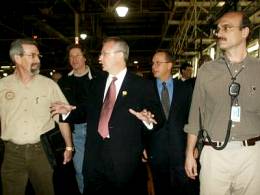|
Tops Michigan's Auto-Sector Win Streak
by JACK LYNE, Site Selection Executive Editor
of Interactive Publishing
Michigan's economic development community and baseball's Detroit Tigers are a study in contrasts - a dissimilarity that the former can only greet with a heartfelt hallelujah.
The 2003 Tigers have just set an American League record for futility, with the most single-season losses ever.
Wolverine State business recruiters, on the other hand, are fast racking up a flurry of Detroit-metro auto-industry wins. Topping that list is Hyundai America Technical Center, which recently decided to relocate and expand its headquarters in a US$117-million, 400-employee facility in Superior Township, near Ann Arbor. The decision counters the expectations of a number of auto industry analysts, who presumed that the Hyundai project would instead take a sharp southward swing.
Hyundai, however, is barely moving at all in relocating the headquarters of its technical center operation, which conducts emissions testing, engineering, research, development and design for Hyundai and Kia autos. Hyundai America Technical Center's 41-employee current headquarters is located in Pittsfield Township, only eight miles (13 kilometers) south of Superior Township.
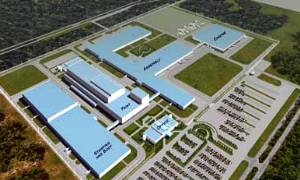
800 Miles South
Korean officials, however, were typically reticent in describing the decision-making details of the headquarters site choice.
"We truly appreciate the assistance provided by the Michigan Economic Development Corporation (MEDC) and Superior Township officials in our site selection process," Hyundai America Technical Center President Won Suk-Cho said in announcing the headquarters location. "We took great care in our search to find the appropriate community for this world-class automotive research and development center. We considered several locations, including sites in other states, but the support of Gov. [Jennifer] Granholm, MEDC officials and Superior Township Supervisor Bill McFarlane convinced us that Michigan was the best choice."
Hyundai America Technical Center will build a 168,000-sq.-ft. (15,120-sq.-m.) expandable facility on a 60-acre (24-hectare) site in the 620-acre (248-hectare) Geddes Center Technology Park, Won said.
The wholly owned Hyundai Motor Co. U.S. subsidiary plans a two-phase expansion at its new location, he explained. It will add 44 jobs to the 41 existing headquarters positions in the new facility's first year of operations. By 2024, the company expects to hire 315 more headquarters workers, Won added.
"Michigan continues to be No. 1 in the nation for automotive research and development," Granholm (D) said in announcing the project. "Hyundai's decision to expand here will further encourage the clustering of tech centers in the state."
Alabama, however, could still be in the running for one of Hyundai's tech centers. Automotive News recently reported that Hyundai has been looking at sites for another $240-million, 300-worker research and design center. That, say industry analysts, may indicate that the automaker is considering setting up multiple U.S. research operations - which would leave Montgomery positioned as a strong contender.
Hyundai also earlier this year opened a $36-million American auto-styling center in Irvine, Calif. To date, though, it hasn't established a U.S. engineering center for parts and product design.

The power-train products manufacturer will move 60 headquarters positions to the new operations base, where it will add another 30 jobs, BorgWarner officials said. The company will spend $8.9 million on the new facility, leasing 40,000 sq. ft. (3,600 sq. m.) of a 60,000-sq.-ft. (5,400-sq.-m.) building that Etkin Equities is building. Construction is scheduled to begin early next year.
Michigan also offered BorgWarner a Single Business Tax credit, a 10-year incentive valued at $2.6 million. The city of Auburn Hills is also providing an eight-year tax abatement valued at about $686,000.
Chicago mounted a counter-proposal, offering $2 million in incentives in an effort to retain the long-time Second City headquarters.
"As a top 25 global supplier focused exclusively on the automotive business," explained Chairman and CEO Tim Manganello, "BorgWarner is a natural fit for metro Detroit - a key location in the global automotive industry, home to several of our customer organizations, and the headquarters of three of our global business units. We expect significant benefits from a Detroit-based location, including closer connections with our global customers and suppliers, opportunities for increased collaboration with the [Powertrain Technical Center], and enhanced industry visibility."
Manganello will also realize a significant benefit with the relocation: a shorter commute. The BorgWarner head lives in Bloomfield Hills in suburban Detroit and has been driving daily to the Chicago headquarters.
Bosal International Also Expanding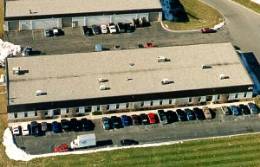
The $3.7-million, 19,000-sq.-ft. (1,710-sq.-m) R&D facility is part of the Japanese automaker's drive to grab a larger U.S. market share and tap into American automotive tastes and preferences. The new facility's opening was timed to support Suzuki's American expansion plans, which call for tripling U.S. auto sales by 2007.
Yet another auto-industry concern is now close to finalizing the particulars of expanding its Michigan presence. Belgium's Bosal International, an auto-exhaust system manufacturer, is looking to buy a site in Ypsilanti for a new 130,000-sq.-ft. (11,700-sq.-m.) facility that would serve as its U.S. headquarters, as well as housing a manufacturing facility. The proposed operation in the western Detroit metro would employ 350 workers, 200 of them in manufacturing. Some of those positions will be new, said a Bosal spokesman, while others will be transferred to the new facility from existing operations.
Bosal already has its North American headquarters and a technical center in Ann Arbor, as well as a manufacturing plant in Warren, Mich. The Ann Arbor employees would be relocated to the new facility in Ypsilanti, company officials indicated.
|
by JACK LYNE, Site Selection Executive Editor
of Interactive Publishing
HAZELWOOD, Mo. – The 2,750 workers at Ford Motor Co.'s assembly plant in Hazelwood, Mo., are probably sleeping a wee bit better these days. Their operation has just dodged a very big bullet - for now, at least.
The 55-year-old St. Louis-metro facility was one of five plants ticketed for closing by mid-decade as part of the cost-cutting plan that Ford announced in January 2002. Many industry observers, in fact, felt that the first major wave of jobs cuts was imminent, setting in motion the run-up to a full shutdown by the end of 2004.
Now, though, the Hazelwood plant has gotten Ford's guarantee that the operation will remain open at least through 2007. The 11th-hour reprieve came as part of Ford's new four-year agreement with the United Autoworkers. Missouri officials quickly followed up on the labor agreement by announcing a $9-million incentive package for the Hazelwood plant.
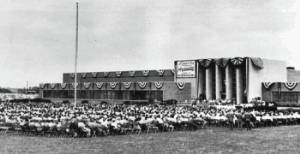
"Given the current economic conditions, I am convinced we would have seen a complete shutdown of the plant had the UAW and Ford not reached a tentative agreement and if we had not been able to offer these incentives," Gov. Bob Holden (D) said in announcing the subsidies. "Our partnership with the local governments, the UAW and Ford provides the company what it needs to plan a new investment for the plant."
Even many of the basics in the Missouri plant's operations, in fact, remain unclear. Ford has been waiting until after final UAW member approval of the new agreement (which came on Sept. 29) before announcing Hazelwood's specifics, including plant staffing and production levels, as well as product line.
The Hazelwood operation currently assembles the Ford Explorer, Lincoln Aviator and Mercury Mountaineer. The Explorer and Mountaineer production was scheduled to be shifted to Ford's Louisville, Ky., plant as part of the "Revival Plan" that Chairman and CEO William Clay Ford Jr. announced last year.
Some analysts are speculating that both the plant's work force and capacity will likely be scaled back.
Holden, however, remained upbeat despite the uncertainties. "We have taken the right steps to continue a prosperous relationship with Ford well into the future," he said of the state's subsidy package.
The incentives the state is hoping will fuel that future include $5 million for employee training, plus $3 million of development tax credits on new equipment purchases. To satisfy criteria for the state's development tax credit program, Ford would actually have to donate the equipment it purchases to a nonprofit organization, which would then lease it back to the automaker for a nominal fee.
The state's package also includes some $1 million of brownfield tax credits for Ford to clean up a contaminated facility that it owns near the plant.
Ford may also get further incentives through tax abatements from both Hazelwood and St. Louis County. The value of those abatements, though, would depend on the size of Ford's new investment commitment for the Hazelwood plant.
Of Millions Still on the Table
Missouri lawmakers in May passed a package providing a wide range of potential incentives for the Hazelwood operation, including tax breaks, job training and a new enterprise zone encompassing the plant. The automaker could qualify for hundreds of millions of dollars in incentives, depending on Ford's investment and which incentives it decides to tap.
Those incentives are only good, though, if Ford commits to investing at least $500 million in the plant. Furthermore, the automaker would have to pledge to keep its existing work force in place for between eight to 15 years (the time frame would be determined by which incentives were employed). Missouri's incentive package is good through Dec. 31, 2005.
"We have no assurance from Ford that this legislation will cause them to reverse their decision, but our bipartisan efforts in passing this legislation have greatly increased our chance of success," Holden told Ford workers at the June incentives bill's signing inside a Hazelwood union hall.
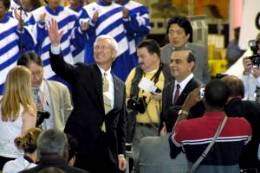
Even with that, though, the facility faces a tough test, given the auto-manufacturing capacity glut. North American auto-industry facilities currently have enough capacity to turn out about 20 percent more vehicles than what consumers actually want to buy, according to industry analysts' estimates.
The U.S. Big Three's new contracts with the UAW will somewhat alleviate that situation, cutting annual capacity by about 800,000 vehicles. At the same time, though, many far more financially healthy foreign automakers are aggressively expanding in North America.
Toyota, for example, is building a new pickup plant in Texas and has added a minivan line to an Indiana plant, while Nissan just opened a new plant in Mississippi. Then there's Hyundai, which is readying a new plant in Alabama, where Honda and Mercedes are also expanding.
Those projects combined will add about 2 million vehicles a year in North American capacity - more than double the Big Three's capacity cut.
And about the only thing that numbers like those can guarantee for Ford's Hazelwood workers is not being able to sleep all that easy.
|
Devon Energy Mounting $400M Alberta Oil Project
by JACK LYNE, Site Selection Executive Editor
of Interactive Publishing
FORT McMURRAY, Alberta – Oklahoma City-based Devon Energy is turning up the thermostat on its Canadian activities, including a new $400-million thermal heavy oil project in the rich lode of the Alberta Oil Sands.
©2003 Conway Data, Inc. All rights reserved. Data is from many sources and is not warranted to be accurate or current.
Known within Devon as "the Jackfish project," the recently announced operation will be built just south of Fort McMurray, which sits nine and a half miles (15 kilometers) southeast of Conklin. When fully operational, the Jackfish project will be able to produce about 35,000 barrels a day of crude oil.
"We are excited about the opportunity to participate in the development of Alberta's world-class oil sands resources through this new large-scale project," said John Richels, president of Devon's Calgary, Alberta-based Canadian subsidiary.
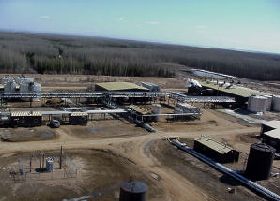
SAGD technology is far less expensive than traditional extraction methods. Conventional open-pit mines and upgraders cost billions of dollars to build.
What's more, Devon has an experiential edge in using SAGD, a technology that many competitors are still only investigating.
"Devon," said Richels, "has a great deal of experience with the SAGD process as operator of the Dover facility, the longest-running SAGD project in the world."
The SAGD pilot program in Dover, Alberta, went online in 1987 under the auspices of the Alberta Oil Sands Technology and Research Authority, an arm of the Alberta Ministry of Energy. Devon Canada took over project operations in January 1998.
Devon will initially drill about 35 well pairs for the Jackfish project, Richels explained. Drilling will be done from multiple well pads to minimize surface disturbance, he said. And the project's surface impact will also be greatly minimized by the underground recovery process.
Those low-impact features are surely welcome news to Canadian environmental authorities, since Devon feels there's enough oil there for 25 years of work. The Jackfish project holds underground recoverable reserves of about 300 million barrels on the 40 land sections on which the company holds leases, the U.S. company estimates.
Upped Canadian Reserves by 400+ Percent
"We've made a long-term commitment to Canada; it's a place where we plan to be for a lot of years," Richels said in announcing the Jackfish project. "We've recognized that the Alberta oil sands are an exciting resource."
Devon, which owns 100 percent of the Jackfish project, plans to rapidly tap that resource, spending some 70 percent of its $400-million capital investment in the first two years following regulatory approvals. The remaining 30 percent will be meted out over the rest of the project's 25-year lifespan.
The company will file regulatory applications in October, said Richels, with production startup expected in late 2006 or early 2007. Devon Canada hasn't estimated how many jobs the Jackfish project will create. The company currently employs 1,400 people in Canada.
Each day, Devon Canada turns out 60,000 barrels of oil and 1 billion cubic feet (30 million cubic meters) of natural gas.
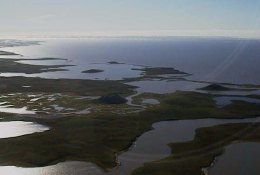
As much as 17 to 18 trillion cubic feet (0.51 to 0.54 trillion cubic meters) of natural gas are trapped beneath the Mackenzie Delta, Richels estimated. And the area's relatively shallow waters increase the project's chances of success. Offshore gas drilling, though, requires "high-risk, expensive wells," he said.
Devon is looking to spread out project risk and expense by taking on partners. Each exploratory well in the Mackenzie Delta will cost between $50 million and $85 million. On top of that is the cost of the supporting onshore infrastructure that will have to be built from the ground up.
A number of multinationals have expressed interest in the project, and Devon hopes to reach an agreement in the next few months, Richels said. Well drilling could begin sometime during the winter of 2005-06, he added.
Declining production in North American fields has boosted prices, renewing corporate interest in tapping the resources of Canada's northern region and east coast, as well as those in Alaska. As a result of buying Anderson Exploration, Devon holds rights to explore 1.8 million acres (720,000 hectares) of land in the Mackenzie Delta-Beaufort Sea, the largest corporate holding in the area.
One factor enhancing the odds for Devon's proposed project is the $3-billion Mackenzie Valley Pipeline. The pipeline, which is being backed by a consortium of energy companies headed by Imperial Oil, would ship gas from the Mackenzie Delta shore to Canadian and U.S. markets. Many companies haven't drilled in the gas-rich Mackenzie Valley because of concerns over the lack of a means to move the gas to market.
And the Mackenzie Valley Pipeline is moving more quickly than initially anticipated. Imperial Oil officials are now saying that the project could be up and running as early as 2009.
 PLEASE VISIT OUR SPONSOR • CLICK ABOVE
PLEASE VISIT OUR SPONSOR • CLICK ABOVE 

